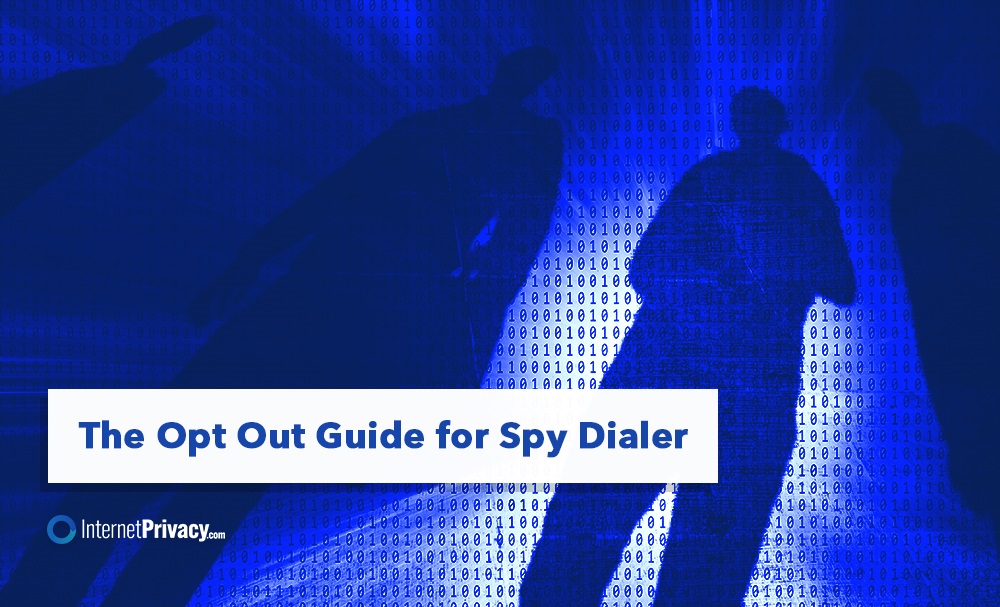The Opt Out Guide for Spy Dialer

Spy Dialer is a controversial online service that raises privacy concerns due to its data collection and potential risks of identity theft. Understanding what Spy Dialer is and how it works is essential to grasp the reasons for opting out.
Spy Dialer is a people search website that claims to provide information on individuals based on their phone numbers. It operates by accessing public databases and online directories to gather personal information. This raises concerns about violating privacy laws, as sensitive information could be accessed and shared without consent.
Privacy risks associated with Spy Dialer include the potential violation of privacy laws, the collection and storage of personal data without consent, and the increased risks of identity theft. By opting out of Spy Dialer, individuals can take steps to protect their personal information and minimize privacy risks.
Opting out of Spy Dialer is crucial for the protection of personal information and the safeguarding of privacy. By removing personal data from their database, individuals can reduce the chances of their information being misused or accessed without authorization. Opting out also helps minimize risks to online privacy and avoid the potential negative consequences of Spy Dialer.
To opt out of Spy Dialer, a step-by-step guide is provided to ensure a smooth and successful process. This will help individuals navigate the opt-out procedure and effectively remove their information from Spy Dialer’s database.
In addition to opting out of Spy Dialer, there are additional steps individuals can take to protect their privacy. Regularly monitoring their online presence, using strong and unique passwords, and being cautious about sharing personal information is essential for maintaining online privacy and reducing the risks of identity theft.
By understanding the concerns surrounding Spy Dialer, the importance of opting out, and implementing additional privacy protection steps, individuals can take proactive measures to safeguard their personal information and maintain their online privacy.
What is Spy Dialer?
Spy Dialer is a free tool that allows users to obtain information about phone numbers. With Spy Dialer, individuals can easily search for details such as the owner or caller’s name, address, and other contact information associated with a specific phone number.
This service requires no registration or payment, making it accessible to everyone. By extracting data from public sources, Spy Dialer provides a convenient way to research unknown numbers, verify contact details, or conduct background checks.
It’s important to note that the accuracy and availability of the information may vary. When using Spy Dialer, it’s crucial to consider the legal and ethical implications, comply with privacy laws, and respect the privacy of others.
How Does Spy Dialer Work?
Spy Dialer is a tool that provides information about phone numbers, including the owner’s name, address, and other details. When you enter a phone number into Spy Dialer, it searches its database for available information related to that number. Spy Dialer collects data from various sources, such as public records, social media, and online platforms. The tool compiles this information and displays it to the user. It can be useful for identifying unknown callers or verifying the identity of a phone number. It’s important to note that Spy Dialer’s data may not always be accurate or up-to-date. The tool also offers a “Secret Spy” feature, which allows users to leave voicemails without revealing their phone numbers. So, How Does Spy Dialer Work?
Privacy Concerns with Spy Dialer
Discover the dark underbelly of Spy Dialer as we delve into the privacy concerns surrounding this controversial service. Unveiling the shocking realities of violation of privacy laws, extensive data collection and storage practices, and the looming risks of identity theft, we uncover how Spy Dialer’s operations have raised serious questions about personal information security. Brace yourself for an eye-opening journey into privacy infringement that will make you reconsider the widespread use of such tools.
Violation of Privacy Laws
Spy Dialer raises significant concerns regarding violations of privacy laws. Using Spy Dialer may potentially infringe upon an individual’s rights to privacy. It is crucial to comprehend and acknowledge that privacy laws exist to safeguard individuals from unauthorized access to their personal information. Therefore, by employing Spy Dialer, one risks contravening these laws and facing serious legal consequences.
Privacy law violations occur when personal information is gathered and utilized without consent. Without acquiring consent, Spy Dialer accumulates and disseminates personal data, jeopardizing one’s privacy. This practice includes acquiring phone numbers and addresses, which can be manipulated maliciously.
It is important to fully grasp the potential legal ramifications of using Spy Dialer and proactively take measures to mitigate associated risks and protect personal information. Recommended actions include opting out of Spy Dialer’s services, vigilantly monitoring one’s online presence, utilizing strong and distinctive passwords, and exercising caution when divulging personal information.
By being well-informed about violating privacy laws associated with Spy Dialer, individuals can safeguard their privacy and ensure compliance with legal regulations.
Data Collection and Storage
Spy Dialer engages in data collection and storage practices as part of its operations. They are dedicated to gathering personal information from public directories and social media platforms, including names, phone numbers, and addresses. All this collected data is systematically stored within their secure database, accessible to all service users.
With extensive data available, Spy Dialer has many records ready for users to search through. It is important to recognize that this extensive collection of personal information raises valid privacy concerns. Individuals may become vulnerable to potential risks such as harassment, identity theft, and fraud by having their data exposed.
It is imperative to note that Spy Dialer’s data storage practices can pose security concerns. Accumulating such a substantial amount of personal information increases the likelihood of data breaches and unauthorized access.
Opting out of Spy Dialer’s service is crucial to safeguard your privacy and address these potential risks. By opting out, you take the necessary steps to ensure that your data is not readily available to anyone searching for it.
Considering the significant impact of identity theft cases in the United States alone, with a staggering total of 444,602 reported incidents in 2018, it is vital to prioritize proactive measures to protect one’s personal information from falling into the wrong hands.
Risks of Identity Theft
The risks of identity theft are significant and can have serious consequences. When someone steals personal information without consent, it can lead to financial loss, damage to credit history, emotional distress, and even legal troubles. Financial fraud is a common outcome of identity theft, as cybercriminals can use stolen information for unauthorized transactions or to open new credit accounts. This places the victim at risk of financial loss and further damage to their credit score.
Identity theft can also cause emotional distress and anxiety for the victim. Dealing with the aftermath, such as resolving fraudulent activities and restoring one’s reputation, can be stressful and time-consuming. There may be legal consequences, with victims potentially being held responsible for debts or illegal activities the thief commits. Proving innocence in such cases can be challenging and result in additional difficulties.
To minimize the risks of identity theft, individuals should take proactive measures to protect their personal information. Regularly monitoring financial accounts and credit reports for any suspicious activities or unauthorized transactions is crucial. It is also important to use strong and unique passwords for all online accounts, including financial and email accounts, and to update them regularly.
Being cautious about sharing personal information, especially online, is essential. It is advisable to avoid providing sensitive information on unsecured websites or to unknown individuals or companies. To prevent unauthorized access, personal devices, and networks should be protected with up-to-date security software and firewalls.
Individuals should shred or securely dispose of sensitive information documents to ensure they do not end up in the wrong hands. By following these recommendations, individuals can significantly reduce the likelihood of becoming victims of identity theft and safeguard their personal and financial well-being.
Why Opt Out of Spy Dialer?
Tired of your personal information being at risk? Discover why opting out of Spy Dialer is crucial. From protecting your data to minimizing privacy risks, this section uncovers the importance of safeguarding your information. Stay tuned to learn how to take control of your privacy and avoid the pitfalls of Spy Dialer.
Protection of Personal Information
The protection of personal information is crucial in today’s digital age. To safeguard your privacy when dealing with platforms like Spy Dialer, take these actions:
- Review your privacy settings regularly on social media platforms and other online accounts. Make sure only trusted individuals can see your personal information.
- Use strong and unique passwords for all your accounts to prevent unauthorized access. Consider using a password manager for generating and storing complex passwords.
- Be cautious about sharing personal information online. Before providing any details, ensure you interact with a reputable and secure website or service.
- Monitor your online presence regularly to detect potential misuse of your personal information. Conduct periodic searches of sites for your name, email address, and other identifying information to stay informed about accessible online information.
Following these steps, you can proactively protect your personal information and minimize the risks associated with platforms like Spy Dialer.
Minimizing Risks to Privacy
To minimize privacy risks and ensure the security of your personal information, it is essential to follow these steps:
- Limit your online presence: Take the time to regularly monitor your social media accounts, online profiles, and any publicly accessible personal information. It is advisable to remove any unnecessary personal details or compromising posts.
- Use strong and unique passwords: Protect your information from easy compromise by creating complex passwords for each online account. It is crucial to avoid reusing passwords across different platforms.
- Exercise caution when sharing personal information: Be mindful when sharing personal information online or over the phone. Share only necessary details with trusted sources and remain vigilant against phishing attempts or scams.
In today’s digital age, taking proactive measures to safeguard your privacy is paramount. By following these steps, you can effectively minimize the risks associated with online activities and better protect your personal information. Stay vigilant and prioritize your privacy for a safer online experience.
How to Opt-Out of Spy Dialer?
Looking to protect your privacy and opt out of Spy Dialer? We’ve got you covered! In this section, we’ll provide a step-by-step guide on how to opt out of Spy Dialer effectively. No more unwanted calls or unwanted exposure. Say goodbye to invasive information and regain control over your data. Follow our expert techniques and reclaim your privacy today.
Step-by-step Guide to Opting Out
To protect your privacy, follow these steps to opt out of Spy Dialer:
- Visit the Spy Dialer website.
- Find the opt-out page.
- Please provide your phone number or personal information for free removal from their database.
- Follow the instructions on the opt-out page to complete the process.
- Check your email for a confirmation message from Spy Dialer.
- Click the confirmation link in the email to confirm your opt-out request.
- Periodically check to ensure your mobile phone number or personal information has been successfully removed from Spy Dialer’s database.
Additional Steps to Protect Your Privacy
Take your privacy to the next level with these additional steps. Find out how regularly monitoring your online presence, using strong and unique passwords, and being cautious of sharing personal information can further protect your privacy. Stay one step ahead and safeguard your sensitive data in the digital age.
Regularly Monitor Your Online Presence
Regularly monitor your online presence to maintain privacy and security. Take the following steps to stay in control of your online information:
- Set up Google Alerts for your name and personal details to receive notifications when your information appears online.
- Search for your name on search engines regularly to track what information is available about you.
- Monitor your social media profiles and adjust privacy settings to ensure that only trusted people can view your posts and personal information.
- Review and enhance security settings on your online accounts. Enable two-factor authentication whenever possible.
- Be cautious about sharing information online, especially on public platforms. Avoid sharing sensitive details like your address, cell phone, number, or financial information.
- Periodically review and update your passwords using a combination of letters, numbers, and symbols.
- Consider using a reputable identity protection service to monitor your credit and detect fraudulent activity.
Use Strong and Unique Passwords
Regarding online security, it is crucial to use strong and unique passwords. Here are some important reasons why:
- Enhanced security: Strong and unique passwords decrease the likelihood of unauthorized access to your accounts. Use a combination of uppercase and lowercase letters, numbers, and special characters to create a harder-to-guess password.
- Prevention of account breaches: Using the same password for multiple accounts poses a significant risk. Hackers can easily access others with the same password if one account is compromised. Create unique passwords for each account to minimize potential damage in case of a breach.
- Protection against password guessing: Weak passwords, like common words or easily guessable information, are vulnerable to brute force attacks. These attacks involve using automated software to try different password combinations repeatedly. Strong passwords make it virtually impossible for hackers to guess.
Remember to change your passwords periodically and avoid sharing them with others. By following these practices, you can significantly improve the security of your online accounts.
Be Cautious of Sharing Personal Information
Sharing personal information online poses significant risks to your privacy and security. Be cautious and mindful of the information you share to protect yourself from potential harm. Awareness of the risks associated with identity theft is crucial when sharing personal information. Cybercriminals can exploit your details to commit fraudulent activities or gain unauthorized access to your accounts.
Therefore, it is advised to avoid sharing sensitive information such as your full address, social security number, or financial details unless it is necessary and from trusted sources.
Exercise caution when providing personal information on social media platforms or online forums. It is essential to recognize that sharing information online can become public and accessible to anyone. Therefore, limiting the amount of personal information you disclose and adjusting your privacy settings to control who can view your profile and posts is recommended.
It is crucial to be careful when interacting with unknown individuals or entities online. It is important not to share personal information with people you don’t know or trust. It is essential to be wary of unsolicited requests for personal information as they may be attempts to gather data for malicious purposes.





